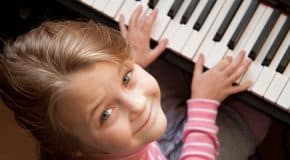by Claire Walker MacHenery
Music Therapy:
Music is such a powerful tool. Whether listening to the radio in our cars, singing in the shower or learning an instrument, our lives are constantly impacted and affected by music and rhythm. Particular songs evoke positive and negative emotions and serve as a reminder of past memories. That being said, it is not a surprise that music has been used as a form of therapy for many years. In home music lessons can serve as a therapeutic music experience and can help children improve their gross and fine motor skills, self-esteem/self-confidence, ability to communicate and much more.
Fine Motor:
For some kids, writing their name, using scissors or playing on their phone or iPad are tasks that come easily to them. However, other children need some additional guidance in these areas. Music therapy is a great way to improve a child’s fine motor skills. Playing the piano helps improve finger dexterity and independence which is crucial for the successful development of fine motor skills. At the beginning of a lesson with some of my students, we play through some exercises on the piano to help them, not only warm-up a little bit, but also work on finger independence!
In addition, playing the guitar and grasping a drumstick or a mallet while playing a percussion instrument helps improve finger strength and improve fine motor skills. For a child with an intellectual disability or one who simply wants to be able to type faster, music therapy would be extremely beneficial.
Self-Confidence/Self-Esteem:
The world can be a scary place for children. They need constant reinforcement and guidance from parents and guardians. For some kids, low self-confidence and self-esteem can be a detriment to learning, growing and exploring the ever-changing world around them. It might make them scared to try and experience new things with constant worry about what might happen. However, that can easily be remedied! In home music lessons and music therapy sessions have proven to boost a child’s self-esteem and self-confidence by learning new songs each week, singing positive affirmations and simply being engaged in creative music therapy, the freedom to improvise and to play whatever comes to mind on the instrument being utilized. Music teachers, to help raise the confidence level of those children that need a boost can therapeutically administer lessons at home.
Attention Span:
For some children, it is difficult to sustain their attention span for the length of the day. A school day might consist of taking tests, writing, reading, working on a variety of subjects and listening to various teachers talk and explain topics. For children who have short attention spans or children with ADD or ADHD, in home music lessons and music therapy sessions have proven to be very successful. They are only 30 minutes in length and provide the child with multiple pieces of music to work on as well as written music theory to complete. In my teaching music lessons with my students, I always make sure that each child is working on a song of their choice of any musical genre and the last 5-10 minutes of each lesson are spent working on it. In addition, when using a keyboard, different instrument sounds are available for the child to explore. There have been many times when, if the student can play through the song on the regular piano setting, I let them select a sound of their choosing.
Music Lessons for Non Musical Goals:
The use of music to reach non-musical goals is extremely beneficial for a lot of people. It provides the person with an opportunity to communicate non-verbally and in a way that, for a lot of people, might make them more comfortable. For children, in home music lessons are a great way of creating a comfortable and safe space to, not only create a life-long love of music, but also to help reach selected non-musical goals that will help children through childhood, adolescence and into adulthood!




